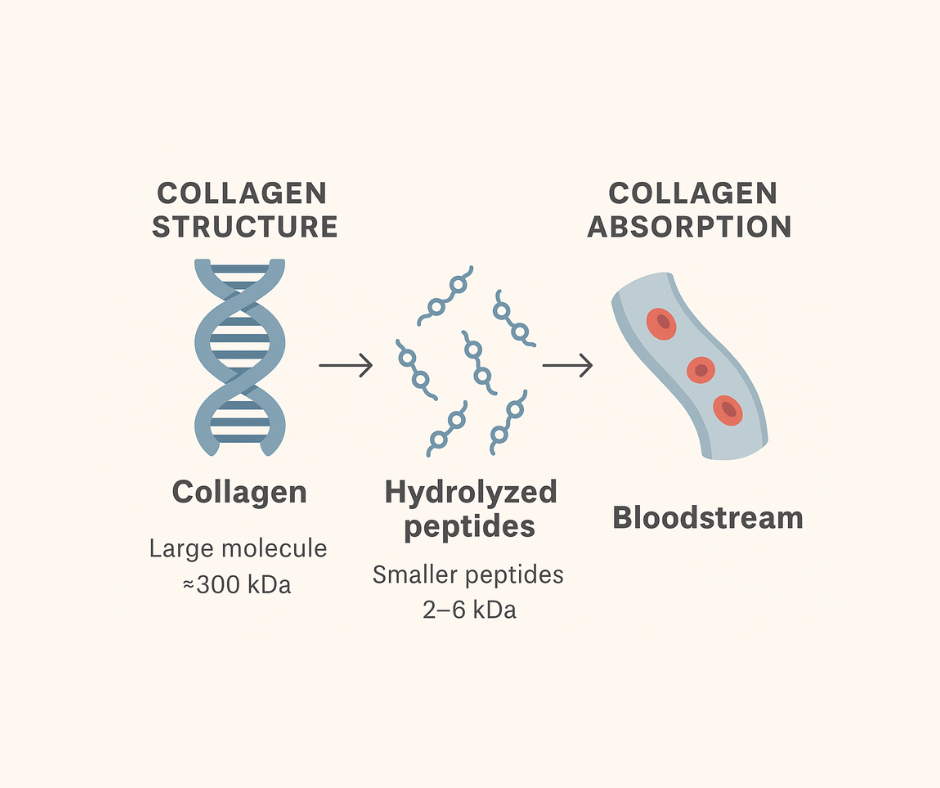
Hydrolyzed Collagen Peptides: Benefits, Dosage, and Science Explained
Share
Hydrolyzed collagen peptides are widely researched for their potential to support skin elasticity, joint comfort, and overall connective tissue health. This in-depth guide explores what collagen peptides are, how they are produced, and what current clinical evidence suggests about their benefits, dosage, and safety. The goal is to provide an evidence-based, educational resource for anyone curious about collagen supplementation. While beneficial, collagen supplements should be viewed as additions to a balanced, nutrient-rich diet rather than replacements for it.
Table of Contents
- What Are Hydrolyzed Collagen Peptides?
- How Are Hydrolyzed Collagen Peptides Produced?
- Collagen vs. Gelatin vs. Hydrolyzed Peptides
- Potential Benefits of Hydrolyzed Collagen Peptides
- Collagen Sources: Bovine, Marine, and Chicken
- Evidence-Based Dosage Guidelines
- Safety and Quality
- Frequently Asked Questions
- Key Takeaways
What Are Hydrolyzed Collagen Peptides?
Collagen is the most abundant protein in the human body, providing structure and strength to skin, bones, cartilage, and tendons. Harvard Health highlights the importance of collagen in maintaining connective tissue. Through enzymatic hydrolysis, the large collagen molecule (~300 kDa) is broken down into smaller fragments (2–6 kDa), known as hydrolyzed collagen peptides, which dissolve easily in both hot and cold liquids and are readily absorbed by the body.
Key Difference: Hydrolyzed collagen peptides are more soluble and bioavailable than gelatin or native collagen, making them suitable for daily supplementation.
How Are Hydrolyzed Collagen Peptides Produced?
Hydrolyzed collagen peptides are derived from collagen-rich sources, including bovine hides, marine fish skin, and chicken cartilage. The key step is enzymatic hydrolysis, where enzymes like pepsin, trypsin, or papain act as precise tools to reduce large collagen molecules into shorter peptide chains. This process improves solubility and bioavailability while preserving essential amino acid sequences that play signaling roles in the body.
Collagen vs. Gelatin vs. Hydrolyzed Peptides
Understanding how different forms of collagen compare helps clarify their effectiveness:
| Form | Molecular Weight | Solubility | Bioavailability |
|---|---|---|---|
| Native Collagen | ~300 kDa | Insoluble | Low |
| Gelatin | Variable (50–100+ kDa) | Dissolves in hot water | Moderate |
| Hydrolyzed Collagen Peptides | 2–6 kDa | Dissolves in hot and cold water | High |
Potential Benefits of Hydrolyzed Collagen Peptides
Skin Elasticity and Hydration
Multiple randomized controlled trials suggest that hydrolyzed collagen peptides may support skin hydration, smoothness, and elasticity. Peptides such as Prolyl-hydroxyproline (Pro-Hyp) are absorbed into the bloodstream and may signal skin cells to stimulate new collagen production.
One 12-week clinical trial reported improved skin hydration and elasticity compared to placebo. Another 8-week trial found reduced wrinkle depth and improved dermal density with consistent supplementation.
Hair and Nail Support
Some studies suggest collagen peptides may support nail strength and hair thickness. For example, a study hosted by The Collagen Company, involving 25 participants taking 2.5 g of bioactive collagen peptides daily for 24 weeks, reported increased nail growth and fewer broken nails. While promising, more peer-reviewed research is needed to confirm these outcomes.
Joint Comfort and Function
Collagen peptides may play a role in supporting joint mobility and overall comfort. A 13-week placebo-controlled trial reported that participants taking collagen peptides experienced improvements in mobility compared to the placebo group. Athletes in another study reported less activity-related knee pain after 12 weeks of supplementation (source).
Exercise Recovery and Muscle Support
Emerging research suggests collagen peptides can support muscle recovery and body composition when combined with resistance training. In one trial, middle-aged men supplementing with 15 g daily during a 12-week training program gained more lean body mass compared to placebo. Other studies indicate collagen may reduce exercise-induced muscle soreness and improve recovery time.
Bone Density and Healthy Aging
Collagen provides structural support for bone tissue. A 12-month study in postmenopausal women found that daily collagen peptide supplementation supported bone mineral density compared to placebo. While more research is needed, this suggests potential benefits for long-term skeletal health and healthy aging.

Collagen Sources: Bovine, Marine, and Chicken
The source of collagen peptides affects their amino acid profile and collagen type content:
- Bovine collagen: Contains Type I and III collagen, supporting skin and connective tissue health. This source is widely researched and economical.
- Marine collagen: Primarily Type I collagen, often considered beneficial for skin. Not suitable for those with fish or shellfish allergies.
- Chicken collagen: Rich in Type II collagen, associated with cartilage and joint support.
A versatile option for daily use is a bovine-sourced supplement, which provides both Type I and III collagen. For example, products like Grass Fed Hydrolyzed Collagen Peptides are designed to support overall connective tissue health. For those who prefer a flavored option, Grass Fed Collagen Powder (Chocolate) offers a convenient way to add collagen to smoothies, coffee, or other beverages.
Evidence-Based Dosage Guidelines
While no official daily requirement exists, clinical studies provide dosage ranges for different outcomes:
| Health Goal | Daily Amount | Study Duration |
|---|---|---|
| Skin elasticity & hydration | 2.5–10 g | 8–12 weeks |
| Nail strength | 2.5 g | 24 weeks |
| Joint comfort | 5–12 g | 12–24 weeks |
| Exercise recovery | 10–15 g | 12 weeks |
| Bone density | 5 g | 12 months |
Safety and Quality
Hydrolyzed collagen peptides are generally recognized as safe in healthy adults, with mild side effects such as digestive discomfort occasionally reported. Those with fish or shellfish allergies should avoid marine collagen. Since dietary supplements are not pre-approved by the FDA for safety or effectiveness, choosing third-party tested products helps ensure quality and purity.
Independent testing is especially important. A Clean Label Project review found variations in heavy metal levels across collagen supplements. Look for brands that provide certificates of analysis (COAs), specify peptide molecular weight (2–6 kDa is optimal), and disclose sourcing (e.g., grass-fed bovine or wild-caught marine).
Frequently Asked Questions About Hydrolyzed Collagen Peptides
What makes hydrolyzed collagen peptides different from regular collagen?
Hydrolyzed collagen peptides undergo hydrolysis, a process that breaks large collagen molecules into smaller peptides. This results in molecular weights of 2–6 kDa compared to regular collagen’s 300,000+ daltons. The smaller size improves solubility and absorption, giving hydrolyzed peptides higher bioavailability.
How much hydrolyzed collagen should I take daily for optimal benefits?
Research demonstrates that 2.5 to 15 grams daily is safe and effective, depending on the desired outcome. Lower ranges (2.5–5 g) are often used in skin studies, while joint comfort and recovery benefits are usually studied at 5–15 g. Consistency matters more than exact timing.
Can collagen supplements be vegan?
No. Collagen is an animal protein. Vegan “collagen” products do not contain true collagen but instead provide amino acids, vitamin C, and minerals to support natural collagen production.
Is bone broth the same as hydrolyzed collagen peptides?
Bone broth contains gelatin and some collagen, but levels are variable and less bioavailable than hydrolyzed collagen peptides, which are specifically processed for absorption.
Do topical collagen creams work?
Topical creams may hydrate the skin’s surface, but collagen molecules are too large to penetrate into the dermis. Oral hydrolyzed collagen is more bioavailable than topical application.
What collagen types are found in supplements?
Bovine collagen usually contains Type I and III, marine collagen primarily provides Type I, and chicken collagen is rich in Type II. Each supports different tissues such as skin, cartilage, or tendons.
Is there a best time of day to take collagen?
Timing is flexible. Some research uses morning intake on an empty stomach, while others use post-exercise. The key factor is consistent daily intake.
Should I take collagen with vitamin C?
Yes, vitamin C is an essential cofactor for collagen synthesis in the body. Many researchers recommend combining collagen supplementation with a source of vitamin C, either from diet (citrus, berries, peppers) or supplements, to optimize results.
What’s the difference between collagen powders and capsules?
Powders are more practical for reaching evidence-based dosages (5–15 g daily). Capsules typically contain smaller amounts (0.5–1 g per serving), requiring many capsules to achieve the studied range.
Can collagen peptides interact with medications?
Collagen peptides are primarily amino acids and have a low likelihood of drug interactions. Still, individuals on medication should consult a healthcare professional before use.
Do I need to cycle collagen?
Studies have examined continuous daily use for up to twelve months without issues. There is no evidence that cycling is required, though periodic evaluation with a clinician is recommended.
Why do collagen supplements vary in price?
Prices differ based on sourcing (grass-fed vs. marine), peptide size, manufacturing standards, and third-party testing. Independent quality certification is more important than cost alone.
How long should I take collagen to maintain results?
Most studies suggest maintaining daily intake for at least 8–12 weeks for skin outcomes and 3–12 months for joint and bone benefits. Continued use is generally recommended to sustain results, as collagen levels naturally decline with age.
Are hydrolyzed collagen peptides safe?
They are generally well tolerated, with mild digestive effects occasionally reported. Individuals with fish or shellfish allergies should avoid marine collagen supplements.
Key Takeaways
- Hydrolyzed collagen peptides are small, bioavailable protein fragments derived from collagen.
- Studies suggest they may support skin hydration, joint comfort, bone density, and exercise recovery.
- Evidence-based dosages range from 2.5–15 g per day depending on the goal.
- Bovine, marine, and chicken sources provide different collagen types for targeted benefits.
- Remember: collagen supplements work best as part of a balanced, nutrient-rich diet and healthy lifestyle.

